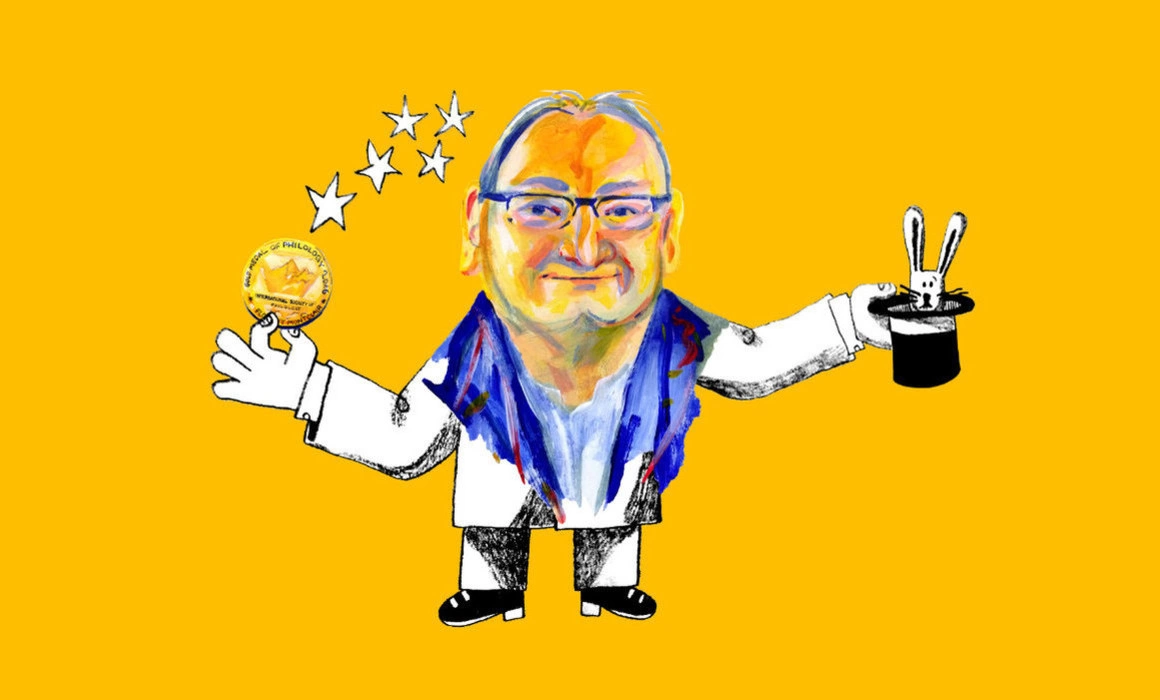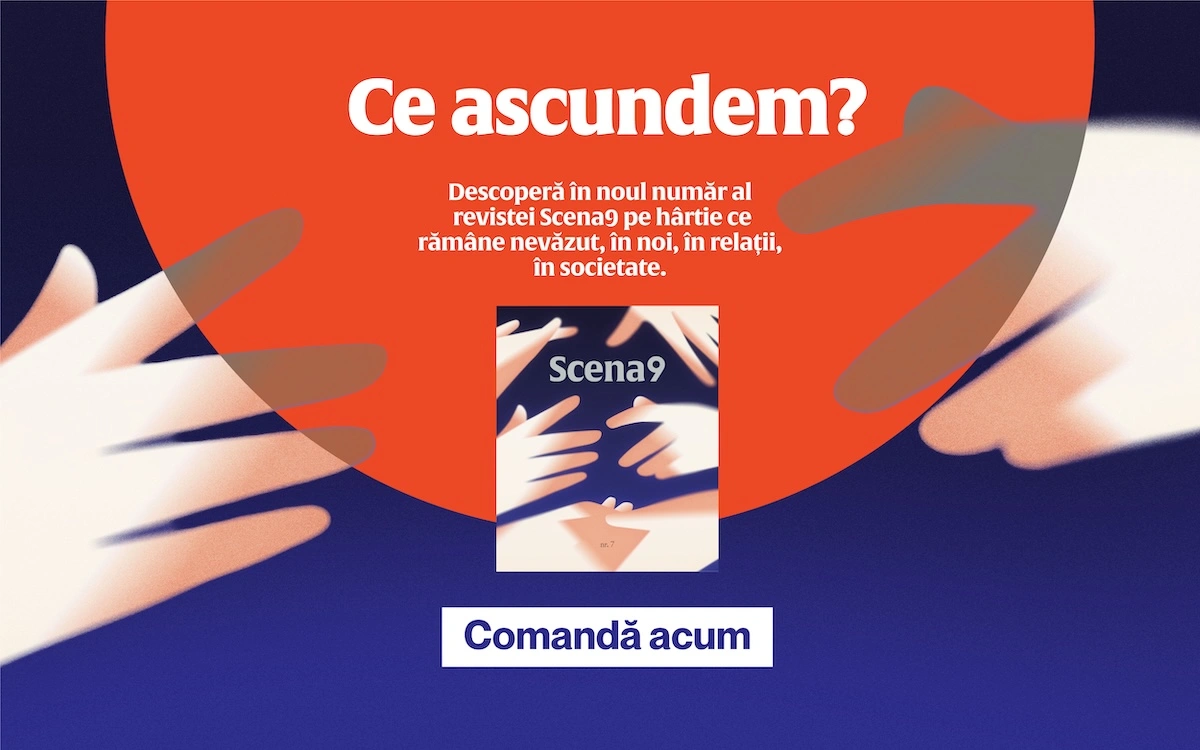Romanian Academy member Eugen Simion recently received the „Nobel Medal for Philology”, which was also allegedly awarded in previous years to cultural VIPs such as Umberto Eco and Noam Chomsky. Even though no one had heard of the institution that was awarding the medal, nor of the distinction itself, a large part of the local media extolled the achievement: we’d finally nabbed a Nobel prize! Our team went searching for the International Society of Philology and spiralled down a rabbit hole of lies, false information, and distorsions. At the bottom of it, we discovered a ruse for scientists, planned out by a Frenchman with a passion for Jules Verne and vampires. Two Romanian MEPs fell for it and are preparing a ceremony for awarding the fake medal this spring, at the Seat of the European Parliament in Strasbourg.
Last December, professor Eugen Simon, director of the Institute for Literary Theory and History „George Călinescu” with the Romanian Academy, former president of the Academy itself for nearly a decade, was notified that he had won the “Gold Medal for Philology Alfred Nobel, the Nobel Prize for Philology”. Simion (85) has authored numerous books and articles on literary criticism and has also coordinated some major editorial projects of the Romanian Academy, amongst which The General Dictionary of Romanian Literature, the complete series of facsimilies of national poet Mihai Eminescu’s manuscripts and the Pléiade-type collection Fundamental Works, which has seen the publication of over 250 titles.
The one-page document he received, written in French and not exactly impeccable English, briefly runs through the history of the Gold Medal for Philology and informs the Academy member that he will receive the accolades at the Seat of the European Parliament in spring 2019. It concludes by congratulating Romania.
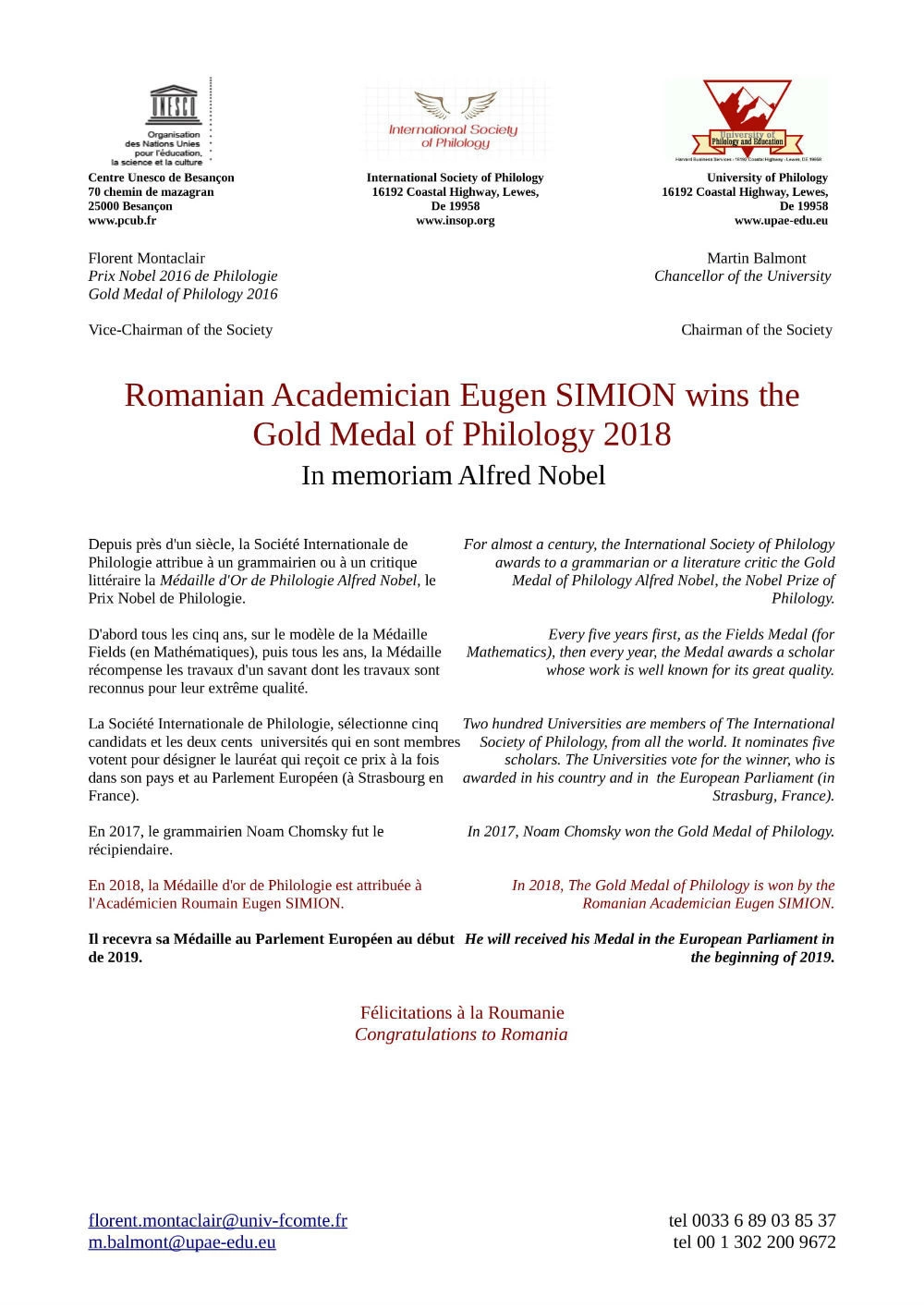
Romania received the news with glee and relief: a Romanian was finally receiving the “Nobel” prize! Most of the press published the release sent by the Romanian Academy without any fact checking, while several literary critics and historians shared it as well. According to the release, “the idea of creating a special prize for grammar or literature analysis critics and scholars was born in 1927, when French philosopher Henri Bergson received the Nobel Prize for Literature, despite the fact that he was neither a poet, nor a novelist. Thus, it was decided that every five years the International Society of Philology would award a Gold Medal of Philology in memory of Alfred Nobel, modeled after the Fields Medal for Mathematics”.
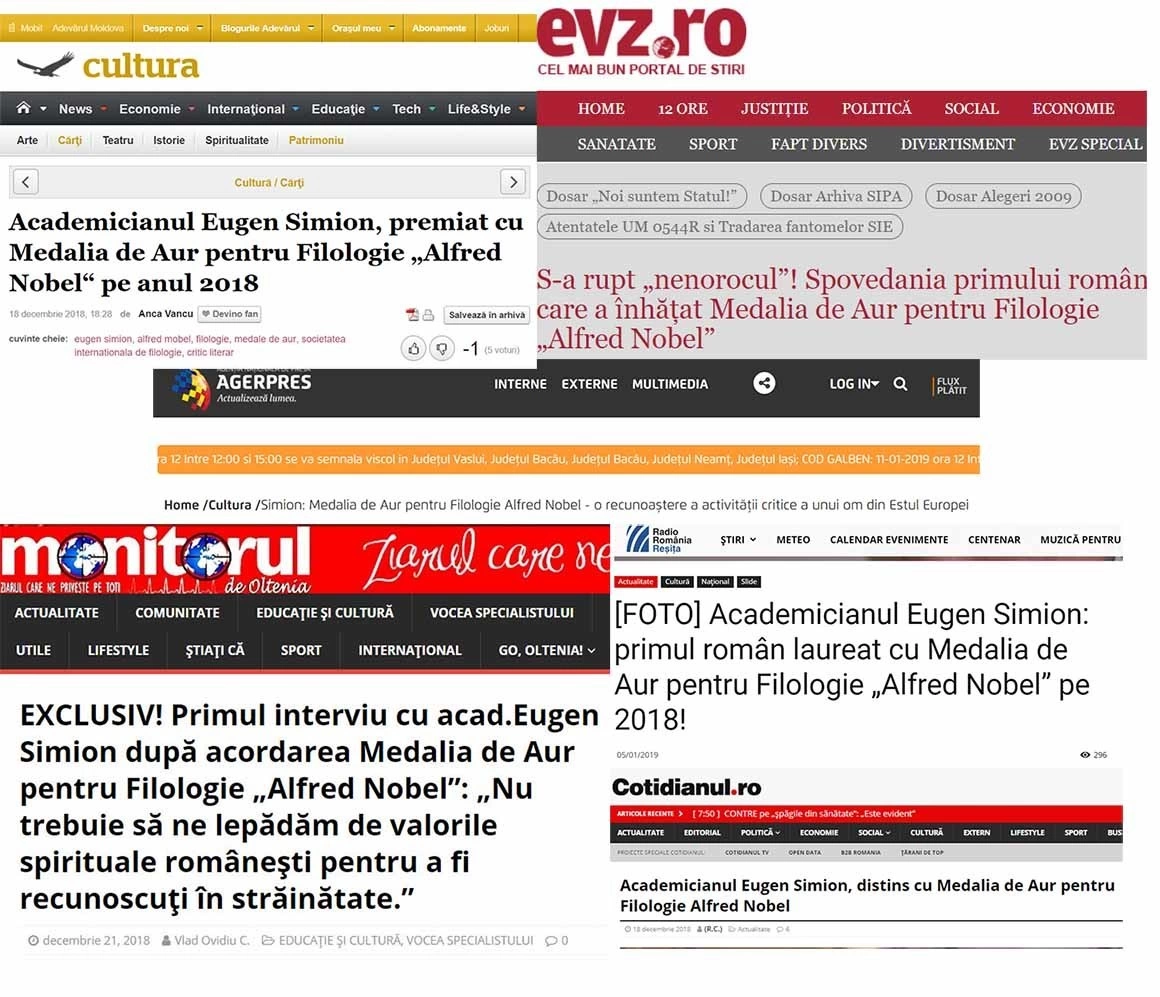
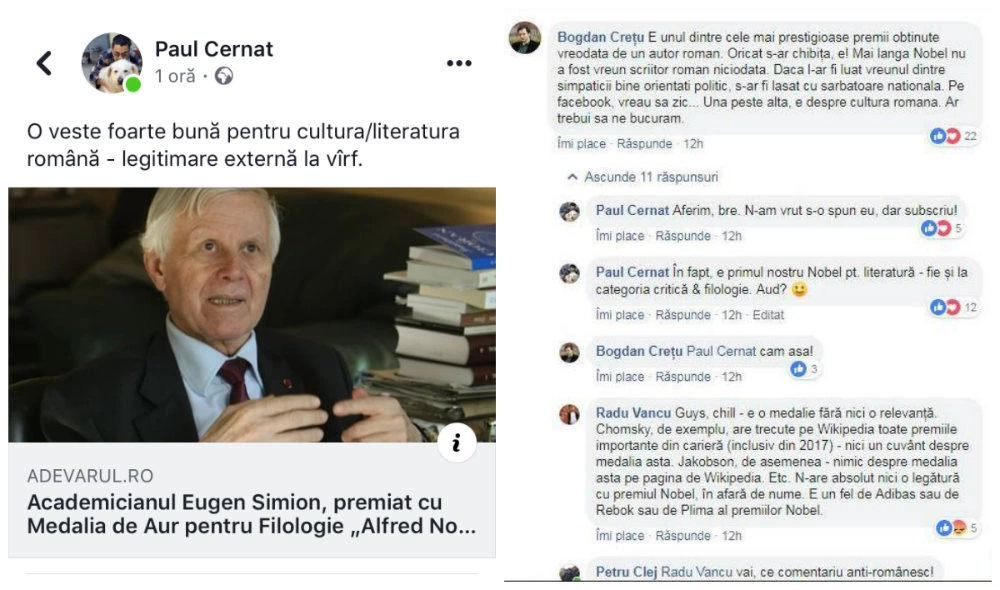
For a prize that claims to have such a long history and such select company - Nobel and Fields - the Gold Medal received by Chomsky and Simion is as obscure as they come. Google doesn’t know much about it either. So we contacted the Swedish Nobel Foundation, in order to find out if they have anything to do with Simion’s prize. They told us they don’t. “The Nobel Prize is a Nobel Foundation registered trademark. The Nobel Foundation is in no way affiliated with the institutions you mention in your email [International Society of Philology and University of Philology],” wrote Mikael Östlund, communication and PR officer with the Nobel Foundation. The same email read that, should trademark infringement be at play, the Nobel Foundation will pursue legal action.
Then, we followed the threads that lead to the three headers of the letter received by the Romanian Academy member - Centre Unesco de Besançon, International Society of Philology and University of Philology - and attempted to figure out what this “Nobel Prize for Philology” really is.
From the little house in the woods to the company in the tax haven
The first company to back the award, according to the letter, is “Centre Unesco de Besançon”. Since the web page in the header leads nowhere, we asked the United Nations Educational, Scientific and Cultural Organization for further clarifications - after all, its logo reigns at the top of the document received by Eugen Simion. “This center is not in our database. It is not patroned by UNESCO, nor is it a second category center,” wrote Laetitia Kaci, from central UNESCO headquarters in Paris, denying any affiliation with the Gold Medal of Philology. “UNESCO is in no way affiliated with the International Society of Philology and has nothing to do with the Gold Medal.”
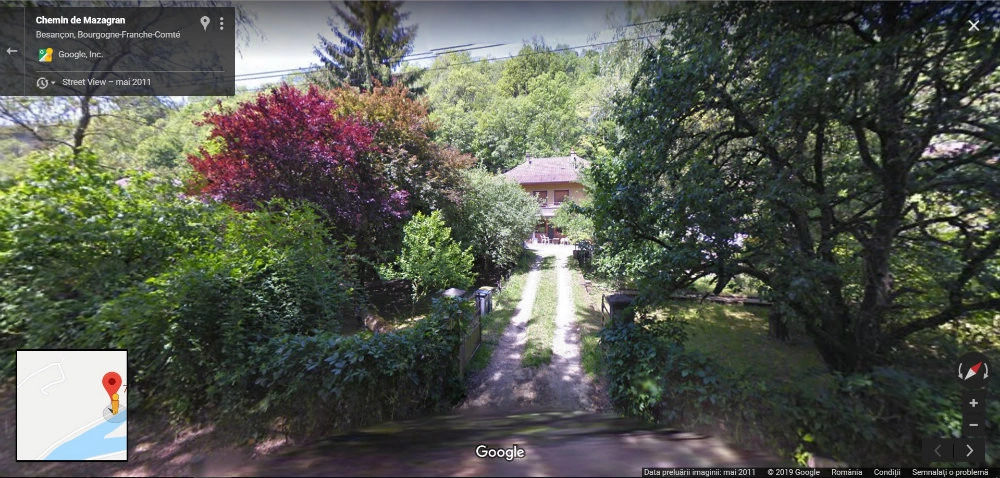
In fact, the indicated address in Besançon doesn’t seem to host any cultural center - only a cozy family home, enveloped in greenery. From Eastern France, we took a hike via Google Maps on the coastal highway in Lewes, a small town in the U.S. state of Delaware - a tax haven that allegedly hosts the International Society of Philology, affiliated with the University of Philology and Education, which awards the Gold Medal for Philology on a yearly basis.

However, this address is not the location of any building that looks like the one in the photo the University of Philology posted to its Facebook page, in turn copied from a Google Maps screenshot. The photo of the University in Delaware, which awards the world’s most important prize in philology is, in fact, a block of flats in Baton Rouge, Louisiana. It’s not just that University headquarters are nowhere to be found in the photo - neither are the alleged classrooms featured on the website. A cursory Google Images reverse search revealed that at least one of the rooms is, in fact, located at Canada’s British Columbia University.
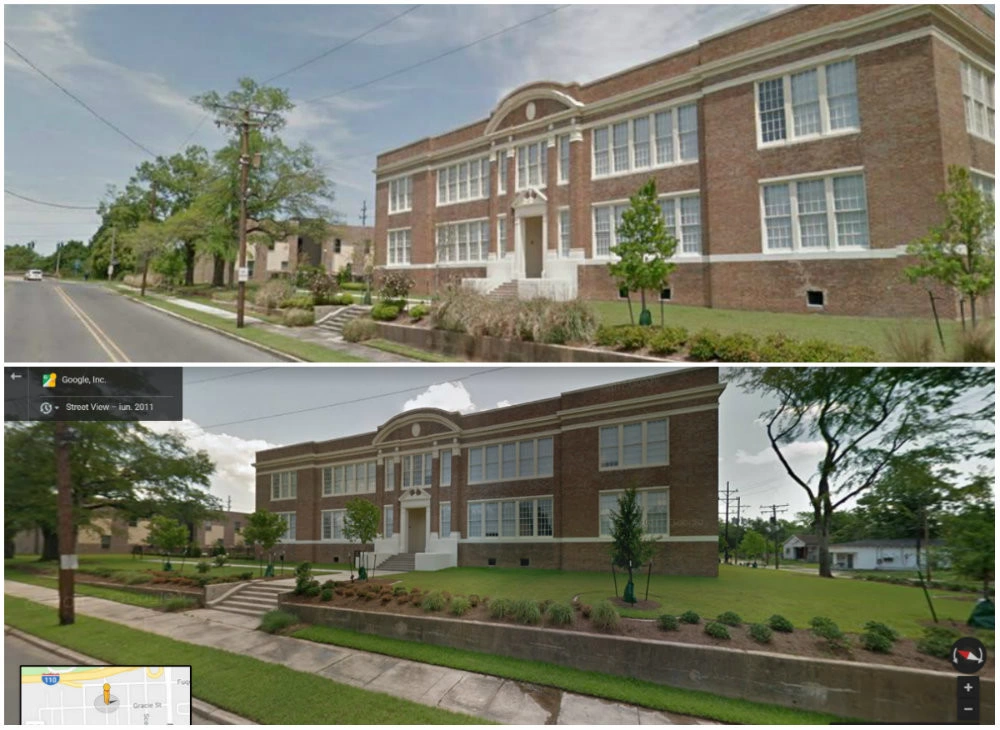
However, this is just the beginning of a landslide of discrepancies, half-truths, fabrications, and false information surrounding the Gold Medal of Philology, which, over the course of our research, turned out to be fictional as well. The entire backstory of this award is, in fact, a textbook case on how to build a forgery, with relatively minimal means. And, despite the fact that the forgery is as feeble as can be, it was solid enough to trick the vigilance of prestigious institutions and important intellectuals, enthralled by the appeal of gold medals and Nobel prizes.
Chomsky has no recollection of the “Nobel” prize
The International Society of Philology also turned out to be fictitious. Its website is a minor masterpiece of the fake news era. The site, which contains so many spelling and grammar errors that it could pass for a philologist’s nightmare, parades a long list of superstars in the field, who allegedly received the very same medal, since 1931 to the present day. The only living recipients are Swedish linguist Göran Malmqvist, humanities VIP Noam Chomsky, Eugen Simion, and Florent Montaclair, a teacher based in a small French town, who introduces himself as the honorary chairman of the International Society of Philology.
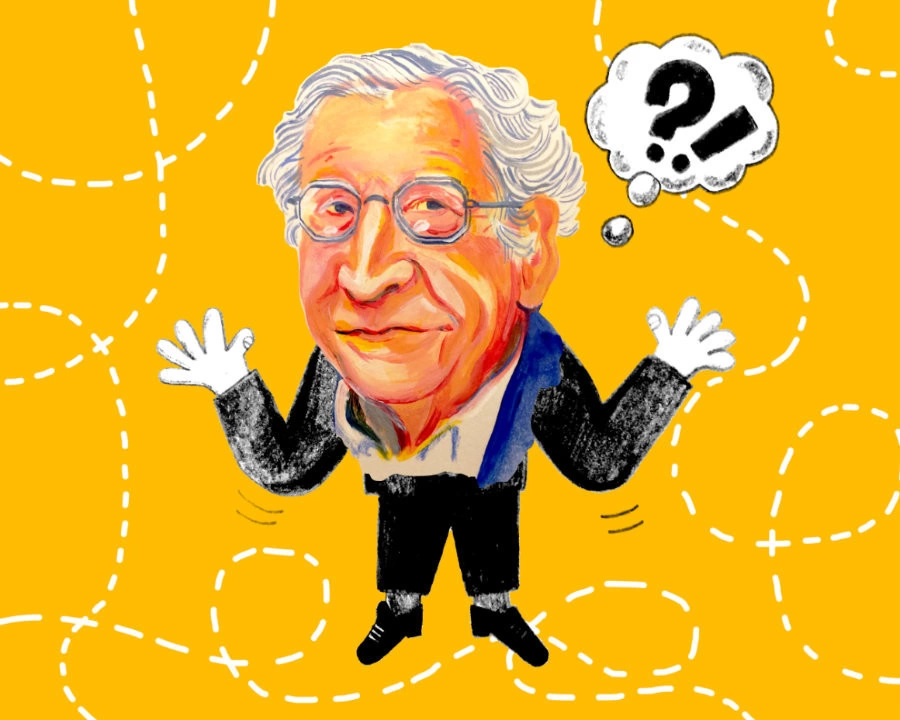
The society bases most of its notoriety on an affiliation with the symbolic acumen of Noam Chomsky, emmeritus professor of linguistics at the Massachusetts Institute of Technology and one of the most influential American intellectuals of the past century. According to the Society’s website, Chomsky also stands as its honorary chairman. In 2016, he allegedly received the Gold Medal for Philology in Paris, against the backdrop of a minor scandal.
The scandal started with an email sent by Florent Montaclair, the other honorary chairman of the Society of Philology and 2015 medal recipient, to the French magazine Philosophie, on November 25, 2016. In the letter, he complains that the French National Assembly changed its mind and called off the award ceremony for the medal. He then asks for help in finding another location for the event. The “news” of turning down “the great Chomsky” snowballs a little on the French side of the internet, despite coming from a single source - Montaclair’s email. Journalists at the French edition of Huffington Post reveal that Chomsky had been invited by the socialist group to the French Parliament. The MPs confirm calling off the meeting (“because of some of his more polemic statements, particularly those about Bin Laden”), yet state that they knew nothing about any award ceremony. The president of the Assembly is also unaware of any medal.
One of the editors-in-chief at Philosophie lends a hand to Montaclair and locates a room at the Center Wallonie-Bruxelles in Paris, where Chomsky holds a talk on November 30 that year and is photographed next to Montaclair, waving a medal in the air.
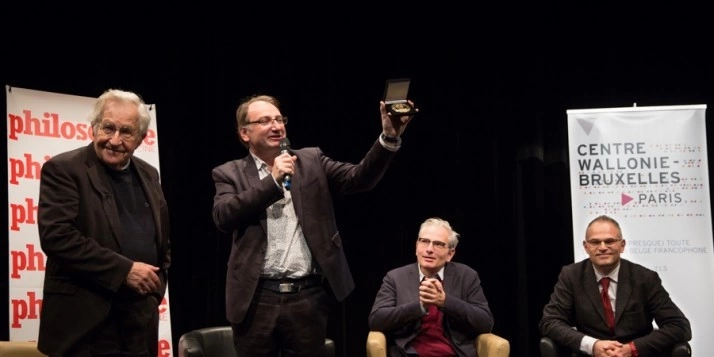
The Society’s website, after several links whose descriptions have nothing to do with verifiable reality, states that Noam Chomsky actually received the medal at the National Assembly, in the presence of several Nobel Prize winners. However, in other texts, Montaclair states that he actually handed the medal to the American linguist “at the [French] National Library, in front of the National Center for Scientific Research.”
We reached out to Noam Chomsky, now aged 90, to find out what actually happened two years ago, at the award ceremony for the world’s most important medal of philology:
“I know very little about the organization. They invited me to Paris for several talks. I don’t really recall much about the individuals involved, or the organization. Give a great many talks organized by all sorts of groups.”
When explicitly asked if he did indeed receive the Gold Medal awarded by the Society, Noam Chomsky states he has no recollection of ever being handed the “Nobel Prize for Philology”:
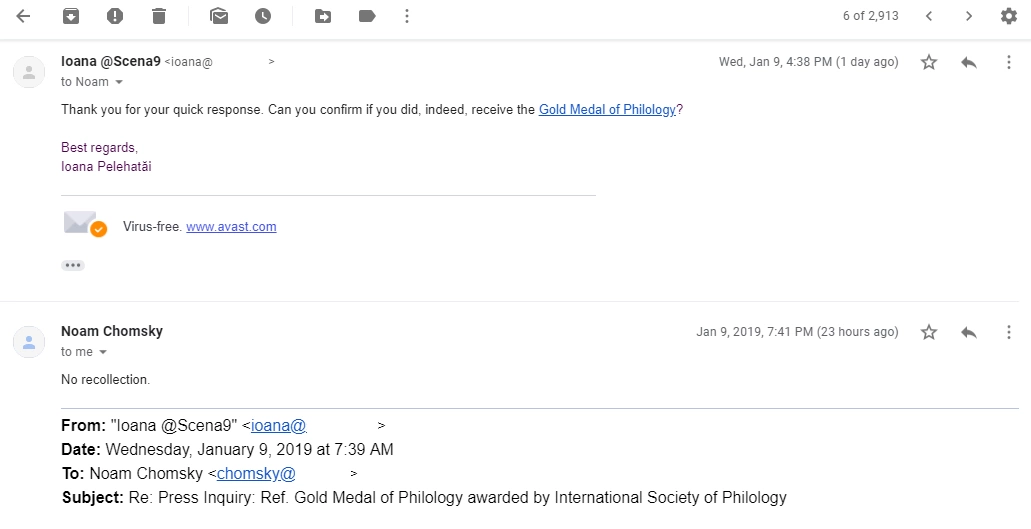
Similarly, Swedish Academy member Goran Malmqvist (94) is in no way associated with ever receiving such a medal - it’s not even listed in the entry about him on Wikipedia. We contacted him to ask about the alleged Gold Medal, but received no response prior to publication. The fact that famous philologists, such as D. Hymes, Joseph Greenberg, or Y. Lotman presumably received this award is only mentioned in their Wikipedia entries, where the sole cited source is actually the website of the International Society of Philology. As to Umberto Eco receiving the “prestigious” gold medal in 2001, Google only indicates two sources: the very same Society and Romanian ‘hearsay’ news site Știripesurse.ro, which relays the release on Simion entering the same league of recipients that includes Chomsky and Eco.
In other words, all online references to the “Nobel Prize for Philology” boomerang back to the page of the International Society of Philology, which claims to be granting this award. No major international publication ever mentions such ceremonies having taken place, no credible source in the field includes as little as a single word on this mysterious society, the American university that allegedly hosts it, or Florent Montaclair, whose name is associated with all these institutions. However, Chomsky’s name seems to have worked like a magic spell, which dulled everyone’s critical thinking.

The African universities and the surprised researchers
Since all of the Romanian press relayed the “news” that the Romanian academic allegedly won out following the vote of more than 200 major global universities (with exactly 123 votes in his favor, according to Simion’s own statements), we wanted to find out what these “universities from all over the world” actually are. The list of institutions on the Society’s membership list is overwhelmingly made up of African universities, such as Université de Ouagadougou (Burkina Faso), Université Omar Bongo (Gabon), Université de Fianarantsoa (Madagascar), and African Virtual University (Kenya). Only seven of the universities are based in Europe. We reached out to some of them, to investigate whether or not they have anything to do with the Society. Both ETH Zurich - Swiss Federal Institute of Technology and the University of Warwick, which responded to our inquiry, denied any sort of affiliation. All sorts of other institutions that have nothing to do with philology have also been bunched up on the list: Indian Institute of Technology Madras, Institut supérieur coréen de science et de technologie, etc.
The list of "individual members" of the International Society of Philology is just as inauthentic. We randomly contacted some of the researchers in various fields, listed on the website:
-
“I’m not a member of this organization” (Daniel Peptenatu, lecturer at the Faculty of Geography, University of Bucharest)
-
“I also came across my name on the INSOP website, while I was looking for references to my papers. I am not a member of the Society and I don’t work for the University of Ankara, as that page states.” (Zeynep Aktüre, PhD candidate at the Department of Architecture with IZTECH, Izmir)
-
“I am mentioned on this website, although I have no connection with this society” (Dr. Susan Parham, director of the Department of Urbanism, University of Hertfordshire)
-
“I know absolutely nothing about this” (Luigi P.M. Colombo, Associate Professor with the Energy Department, Polytechnic University of Milan)
The same researchers are also listed in the “2019 Congress” section of the Society’s site, this time along with their email addresses. None of those we contacted knew anything about this. The call for papers for the congress that would allegedly take place in June 2019, in Delaware, is not only poorly written, with grammar mistakes and zero precision, but its deadline is December 2015.
The "Recent Works" section of the site is also fabricated by the International Society of Philology: the entire list of works cited is copied verbatim from the bibliography of the modern criticism course held at the University of Santa Cruz (which actually exists). In the "Works" section of the site, the Society appropriates titles published by members of the Philological Society, Great Britain’s oldest active research society.
In other words, the site of the Society that claims to have awarded medals to Chomsky and Eco, and that Eugen Simion recently labelled as “a serious institution” in a recent lecture, is almost entirely untrue, in terms of the information it presents.
The university made up behind a screen
The plot thickens, however, as the International Society of Philology is backed by another fictional entity: the University of Philology and Education in Lewes, Delaware, a small town with little over 3,000 inhabitants. The address listed on the university’s website is actually the headquarters of DelawareInc, a company which, according to its own website, is managed by Harvard Business Services Inc (HBS), a firm that helps you set up firms in the state of Delaware. Why this U.S. East coast state in particular? Because it’s a sort of American Cyprus, a tax haven where anyone can anonymously own a business. Even people located outside the United States, as the DelawareInc blog explains.

According to OpenCorporate.com, a database listing all the companies involved in the biggest press leaks in recent years, HBS is linked to over 140,000 companies - just like Mossack Fonseca, the famous company involved in the “Panama Papers” debacle, for managing over 200,000 off shore companies. It’s worth mentioning that HBS was also previously involved in a corruption scandal that emerged in Hunedoara County, Romania. The thousands of companies managed by HBS also include University of Philology and Education LLC, which granted Simion his “award”.
The “university” is not listed in the database that includes all the graduate education institutions accredited by the U.S. Department of Education, nor in the World Higher Education Database. In other words, it’s just a limited liability company among many other such companies.
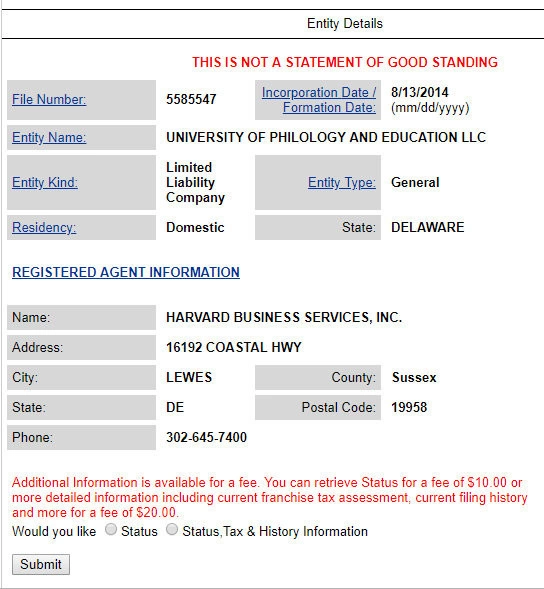
WhoIs.com, a website that can tell you where in the world is a certain site registered, indicates France for the “university” page - as it does for the “Society of Philology” it is affiliated with. The French penchant of the Delaware-based institution transpires several times: the homepage of the Institute is labelled “Accueil” (“welcome”, in French). When you call any of its phone numbers, part of the answering machine message is also in French. In fact, even the coat of arms of the “university” is a “loan” with a French connection. The lion is a variation of the emblem of the Franche-Comté region in France, where Florent Montaclair, the honorary chairman of the International Society of Philology lives, as “coincidence” would have it. He also claims to have taught several courses at this fictional Delaware university.
Much like the page of the International Society, the website of the University of Philology and Education is a chaotic compilation of lies and plagiarism from various sources. The site lists several news that can’t be verified. For instance, Sandra Noak, who was actually supposed to hold a conference on January 14, on the work of Russian linguist Nikolai Trubetskoy, does not feature in any Google search results. The same applies to some of the other lecturers, such as John Slo, or Ronald Ronyder.
The page providing information on applying to the programs offered by the university is just more copy-paste. At the end of said info about applications, we are thanked for the “interest in the University of Arkansas”. The file regarding student complaints is vaguely adapted after the regulations at the University of London, which is also the source for the plagiarism of several other administrative documents. Etc.
All our attempts at finding out more on the history of the “Nobel Prize for Philology” have lead us to the same dead-ends: the International Society of Philology and the University of Philology in Delaware. They both recycle the same misinformation or, best case scenario, relay mistaken or imprecise facts.
All roads lead to Florent Montaclair
The falsely UNESCO associated center in France, the fictional university in Delaware, the lecturers with made-up names, the copied lists of publications, Noam Chomsky and Eugen Simion do have something in common, though. His name is Florent Montaclair, a 49-year-old man, about whom our only certainty is that he did, indeed, complete a PhD on Jules Verne. (The second PhD he attributes to himself in his resume, on gypsies in French literature, was allegedly awarded by the fictional university in Lewes). We also know that he’s passionate about vampires and fantasy novels, Eugen Ionesco and fake news. Judging by an article published by the local French press, he’s also an expert in literary criticism and 19th century literature, lives in Montbéliard, a town with a population of 27,000 in the eastern French region of Franche-Comté. He also teaches at ESPE in Belfort, an educational science university, as well as at UFR STGI in Montbéliard, a branch of the Franche-Comté University. However, most of the information about him is contradictory or impossible to verify.
Montaclair claims he was named honorary chairman of the International Society of Philology for two years, after receiving the Gold Medal in 2016 from the institution - which he seemingly made up himself. The Frenchman is also the one who sent Eugen Simion his award letter, as well as the sole actual person, in an ocean of false identities, to provide all the details on the background of this award and the International Society of Philology.
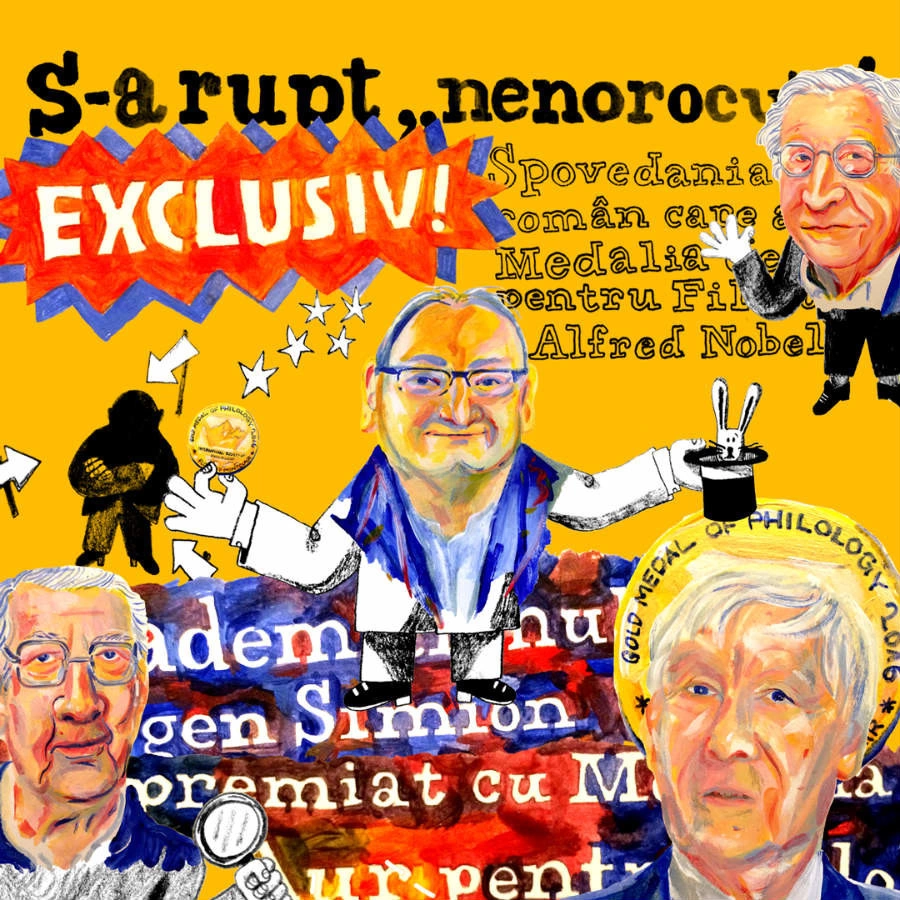
His resume (laid out over the course of 15 pages) links him with the fictional university in Lewes, Delaware. Allegedly, that’s where he managed the course modules on the French Serial Novel and the Grammar of Jules Verne. It’s also where he claims to have taught hundreds of classes, but his resume forgets to mention specifically what he taught and when. The same resume lists his title of former president of the “Unesco Center in Besançon”, which UNESCO denied to have ever been formally affiliated with, and which is not mentioned anywhere else online, except for the story of Montaclair’s dalliances.
That same resume claims that Montaclair received both the Gold Medal for Philology, as well as the “Medal of the French National Assembly”. However, the latter is either granted to French deputies as they set out on their mandates, or to citizens with great achievements, by members of parliament. There is no conclusive proof that the man behind the philology farce has ever received such accolades.
Besides, even the context in which Montaclair allegedly received the “Nobel Prize for Philology” is unclear. December 2015 is the date of the first news published in the French newspaper L'Est Républicain, concerning a teacher at the University of Franche-Comté, who supposedly received the world’s greatest distinction for philological research in New York. This piece also includes Montaclair’s claims to being the head of a “UNESCO research facility”, as well as his statement that the award ceremony was postponed because of recent terrorist attacks and rescheduled for February 2016, at UNESCO headquarters in Paris. The Frenchman was planning to discuss “the role of the vampire in 2010 culture” at this solemn event. Montaclair says he probably received this award due to the impact of his research on the global landscape of philology. He adds that “this award shows that even professors at very small universities can be of interest for the whole world.”
However, a subsequent news article published by the same outlet says that the distinction, an “equivalent of the Nobel Prize”, was awarded to Montaclair at the headquarters of the French National Assembly, by its president. Yet one of the president’s tweets features two photos of a room, a couple of chairs, some people, and a painting, congratulating Montaclair for a completely different medal, awarded by France’s most important research institution, the National Center for Scientific Research (CNRS). (Spoiler: Montaclair never received any medals from the CNRS).
Florent Montaclair’s actual published books (in the sense that they can be pinned down in several library catalogues) largely deal with 19th century genre prose: serial novels, Jules Verne, vampire literature, fantasy, etc. Yet most of them were never cited in relevant academic research and almost all of them were published by the mystery publishing house Presses du Centre UNESCO de Besançon.
To round off his panoply of forgeries, Montaclair’s resume states that in 2017, he will have co-authored, along with Noam Chomsky, a linguistics paper titled “The Galileo Challenge: a new aspect of the study of language”. The text was actually written - and published as such - by Chomsky himself. What’s more, a TEDx talk held by the Frenchman bore the same name, but in French: “Le défi Galiléen”. As for another conference he attributes to himself in his resume, about which he claims was held at Harvard, with the title of “Gispsies (sic) in french serial novel”, Harvard University was unable to confirm if it ever actually took place.
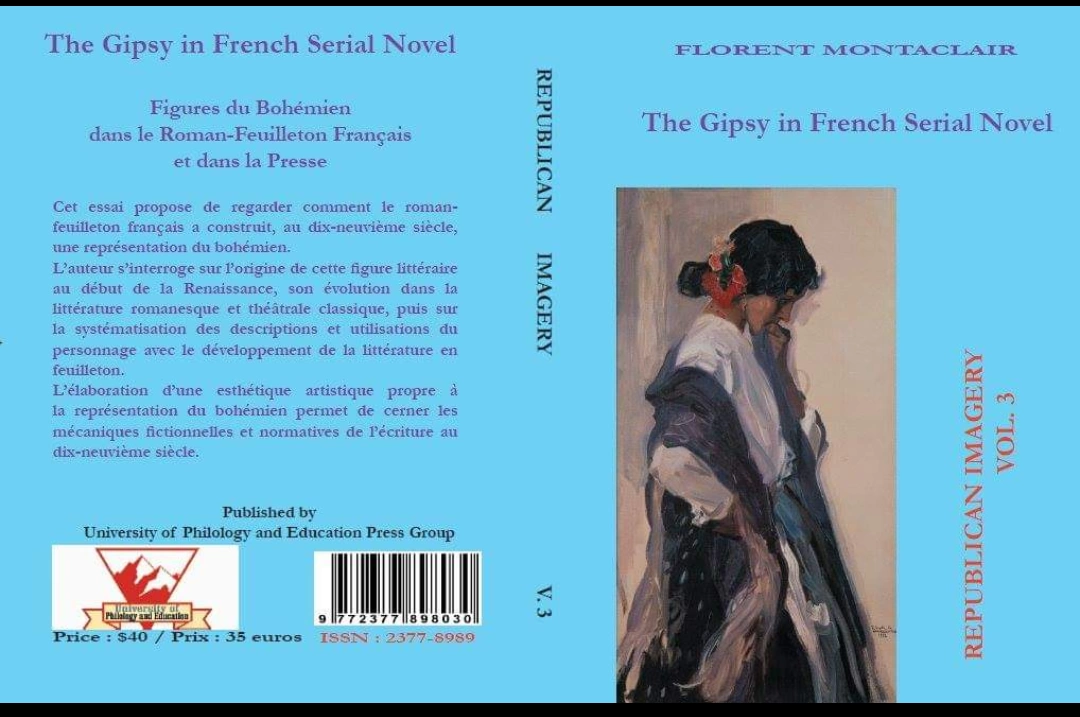
The ghost president
As research shows, Florent Montaclair didn’t just invent a university, an international philology society, a medal “rivaling” the Nobel Prize, and a convincing story for the Romanian Academy, but, most likely, he also fabricated a character to keep him company.
The character in question is Martin Balmont, the man behind the scenes. Although the site of the International Society of Philology doesn’t feature his name, Montaclair claims that Balmont is the president of this society. The page of the University of Philology lists Balmont as rector. The very scarce information about him on Wikipedia claims that he is the author of several obscure fantasy novels, published by the press of the Unesco Center in Besançon, where many of Montaclair’s papers were also published. In one of his books, Balmont thanks all the authors that helped and shaped him, amongst whom Jules Verne and Bram Stoker, who Montaclair avowedly fetishizes. To make this fake identity game all the more exciting, Matin Balmont also features in one of the course bibliographies that Montaclair claims to have taught. Balmont has all the makings of a “doppelganger” that Montaclair himself invented.
Meanwhile, the same Balmont is co-signatory of the letter informing Eugen Simion that he has won the “Nobel for Philology”, alongisde Florent Montaclair. The emblem on the gold medal is, in its turn, stolen from an American company selling wood byproducts. In an article in the French local press, the journalist suggests that the engraving in the background features the Appalachian Mountains.
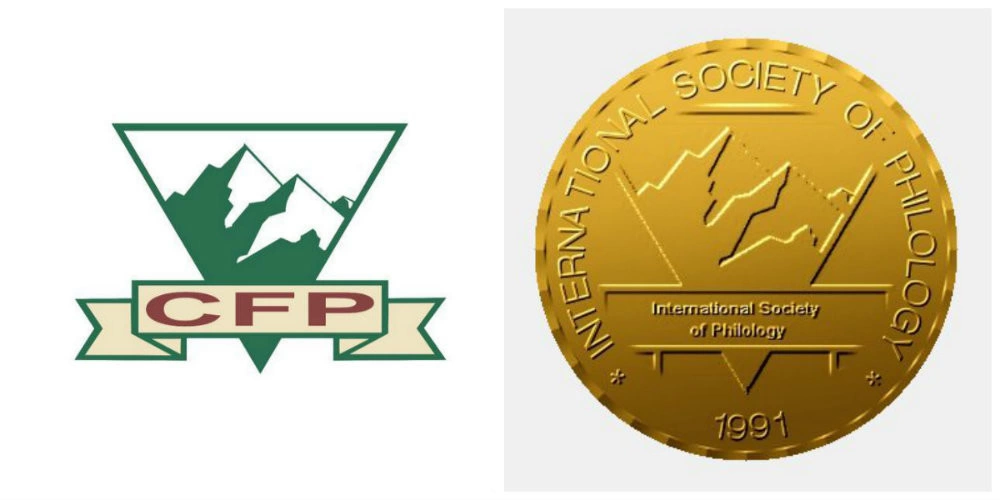
And, although all the leads in this farce harken back to Montaclair, it is not entirely clear what he stands to gain from it. One potential stake is money, so long as the statute of the International Society of Philology claims that membership taxes can go up to as much as 16,740 Euros. However, it’s hard to believe that a person willing to invest such an amount just to vote for the winners of the Golden Medal of Philology could overlook so many faux-pas, lies, and inadvertencies. Most likely, the main thing at stake is symbolic: by inventing an award aspiring to Nobel-level prestige, Montaclair would also become famous, as a recipient standing next to Chomsky and Eco. And if we were to take his word just once, in his statements for the local press, the Frenchman expresses his hopes that this award will stand as motivation for the French state to found a research center in his area. “Will this great region and its universities once more miss out on the opportunity to build a world-renowned research hub?”
We wrote to Florent Montaclair to explain that our research leads to the conclusion that the International Society of Philology and the Gold Medal for Philology are his fabrication. By publication time, we hadn’t received any answer.
LATER EDIT: Florent Montaclair did not respond to our questions. Instead, on the one hand, he tells us that “it is very, very, very strange for the Romanian press to take interest in purely internal affairs. Imagine if the University of Bucharest awarded an honorary PhD to a Chinese man… Why should this be of any interest for the masses, mobilize energies, stir up controversies?” To conclude, he suggested that “you should undoubtedly be proud that a Romanian has received international recognition.”
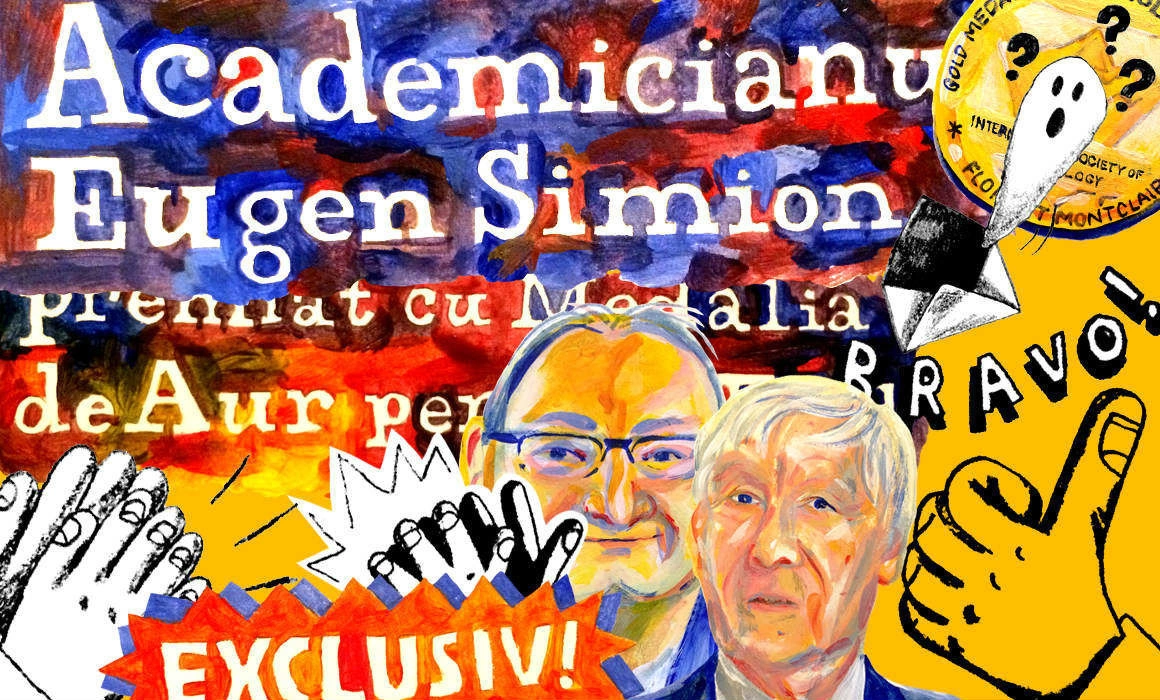
Praise for the Romanian “Nobel”
The story invented by Florent Montaclair, through which aging researchers are promised the “Nobel Prize” - no less -, the supreme accolade for their entire career, is, in fact, a puzzle of lies. Its author, however, is terribly negligent and the fiction behind the Gold Medal can be very easily picked apart, through a few Google searches. Even as news of Eugen Simion’s award was just breaking, several Romanian men of letters rose question marks about the legitimacy of the International Society of Philology and the authenticity of the Medal. However, fiction turned out to be more believable.
On Thursday, January 10, a meeting with Eugen Simion took place at the University of Bucharest. During the proceedings, several personalities in Romanian academia held speeches to honor the “recipient of the International Academic Award, the Gold Medal for Philology Alfred Nobel 2018”.
The event took place in the Council Hall of the Faculty of Letters and lasted for over two hours. During that time, the main topics for discussion were Eugen Simion’s career and this “prestigious distinction”. Before discussing Simion’s achievements, Romanian Academy member Mircea Martin noted that he was surprised by the existence of this award: “I want to start by saying that I had no idea about the existence of this medal before some two weeks ago. And I’m probably not the only ignoramus.”
Eugen Simion himself admitted that this distinction came “out of the blue”, but that he was also “terrified” to see the list of great personalities that received this “highly honoring” medal throughout the years. Literary critic Paul Cernat noted that Eugen Simion, whose “individual and collective works stand as testament for the same unshakeable will,” “won out decisively at the polls”.
In the end, Eugen Simion reminded the university students in the room how important truth is: “I once wrote on the cover of a book that I am a man for whom truth exists.” At the same time, he announced that he is preparing for the award ceremony, “which will take place in March at the European Parliament” and which, “to my surprise, will last for four days”.
The ceremony will actually last for “about two hours”, explained Romanian ALDE MEP Renate Weber. Weber, along with liberal Romanian MEP Cristian Bușoi, is preparing the event for March in Strasbourg. The two took up Florent Montaclair’s proposal for organizing the event - which he had sent out to several Romanian MEPs. “I, too, together with my entire cabinet, will be involved in organizing the event and receiving the guests, who will include Romanian MPs and 40 figures from the academic world,” Renate Weber told Scena9 over the phone.

We reached out to Academy member Eugen Simion, to inform him of the results of our research and ask him whether he had received any clues as to the possibility that the medal is a farce. We had received no response by publication time.
UPDATE, January 18: After the publication of the article, we got a hold of an invitation that Montaclair had sent to several Romanian MEPs, asking them to join the award ceremony for Eugen Simion. There are discrepancies even in this document - such as Chomsky receiving the medal in Brussels (in other sources, Montaclair states that this allegedly happened in the National Assembly or at the French National Library). At the same time, the two signatures, belonging to Montaclair and Balmont respectively, look terribly similar. The letter, which states that Romanian MEPs Renate Weber and Cristian Bușoi have booked a room for this event, ends with “Could you come to this ceremony for Romania?”
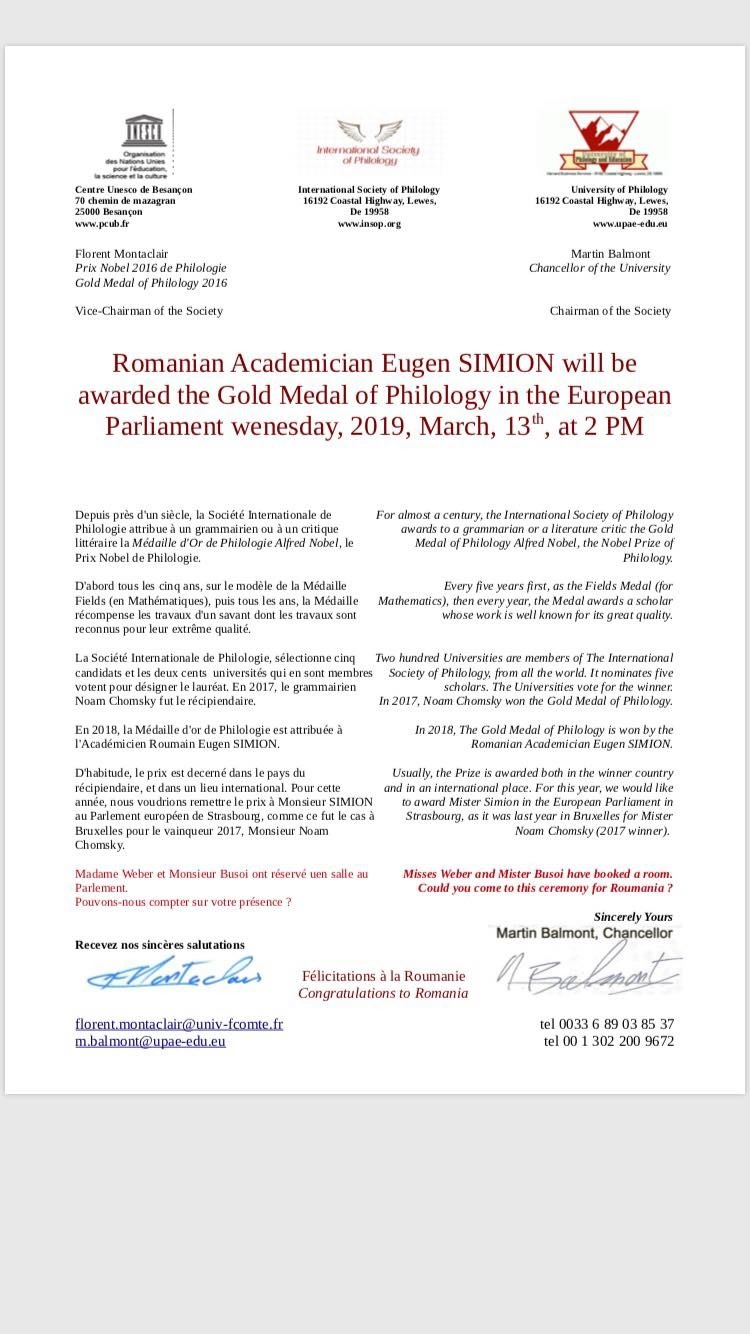
After our investigation was published, several press outlets that had broadcast the initial news on Eugen Simion’s “Nobel” win remitted retractations. Also, numerous literary critics and historians, who had initially shared the news and purported the prestigious nature of the medal, acknowledged their mistakes.
On January 15, Romania’s National Culture Day was celebrated at the Romanian Atheneum in Bucharest, where Academy Member Mihai Cimpoi publicly congratulated Eugen Simion for the award he had received. Its authenticity wasn’t questioned by anyone in the room. The following day, however, the Romanian Academy removed the announcement of the Gold Medal from its homepage.
On January 17, the Romanian Academy released a statement through which it was announcing the commencement of an investigation on the Gold Medal of Philology:
"On December 17, 2018, Romanian Academy member Eugen Simion and the Romanian Academy received a notification letter, through which the International Society of Philology announced that it was awarding Academy member Eugen Simion the Gold Medal for Philology Alfred Nobel. Following the press investigation released by four Romanian journalists, we learned, with great concern, that the actual existence of the prize and the awarding institution are being called into question.
The Romanian Academy takes note of the press investigation and will commence its own investigation into the situation. In this context, the Romanian Academy expresses its grave concern towards the proliferation of the phenomenon of falsifying reality, through lies and imposture. This phenomenon is increasing at a global level and compromising essential values for the normal functioning of society: truth, honesty, trust. The proliferation of this phenomenon is placing serious institutions in the situation of having to turn into investigators and detectives, thus interfering with their proper functioning.
The Office of the Romanian Academy Presidency”
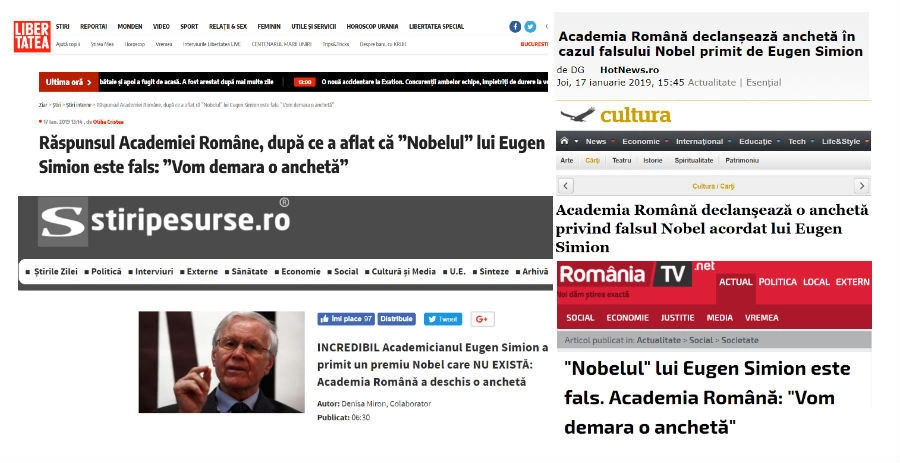
We called the two Romanian MEPs, to check on the evolution of organizing the awards ceremony in Strasbourg, yet the two seemed intent on distancing themselves from the initiative. In spite of her initial assurances of involvement in the organizing efforts, along with her entire cabinet team, ALDE Euro-deputy Renate Weber stated today:
“Do understand that I’m not involved in organizing this. All I did was book a room. I can call off the booking tomorrow or two days ahead of the event. So long as this gentleman, Montaclair, has not contacted me again and hasn’t sent me a list of participants, which I need to file with the European Parliament’s Security Office, there’s nothing I can tell you.”
Liberal Cristian Bușoi says he hasn’t been following the subject and that he hasn’t received any more news from Mr. Montaclair either. Considering these statements, it’s unclear whether the award ceremony for Eugen Simion will actually take place in Strasbourg.
Another unclear aspect is who would have footed the bill for the European Parliament ceremony: Romanian politicians claim their sole contribution was securing the room, while Academy Representatives state that they never discussed the costs of the award ceremony. “That issue never came up,” says Carmen Dobre, with the Romanian Academy Press Service.
At the same time, it’s not likely that a fictional institution would be interested or, for that matter, well-endowed enough financially to organize such an event.
Scena9 received news from Florent Montaclair on Friday, January 18. However, the Frenchman provided no concrete answers to any of our questions regarding the fictional institute and medal. He did, however, continue to recycle loads of misinformation and irrelevant details. His email ends as follows:
“To conclude:
-
Is he being awarded a Medal? Yes or no?
-
Is Mr. Simion the recepient of the medal? Yes or no?
-
Will he be receiving the medal before a committee of Academy members, both members and non-members of the Society? There’s no way for you to know, because that’s the final subject we’re still discussing! After all, there have been no public statements on this topic yet.
As such, you should ask yourself why the Romanian press is so bothered that a scientific society declares a researcher to be the winner of a golden medal!”
But the beginning of his email is far more interesting:
“Dear Madam,
I think the Romanian press must once more become rational.”
Scena9 has informed UNESCO and The Nobel Committee, whose names are being abusively used by Florent Montaclair to validate the prestige of a non-existent institution.
Reporting contributions: Victor Ilie / Inclusiv and Twitter user McCantow
Translated from the Romanian by Ioana Pelehatăi
